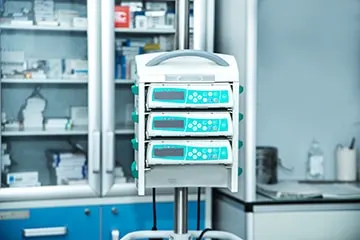The Top Causes of IV Errors

Hospitals and healthcare facilities rely on IV infusion pumps to dispense fluids, such as medications or nutrients, to improve patient health. Your facility likely relies on the two classes of infusion pumps -- large volume pumps for nutrients and small volume pumps for medicines or hormones -- to assist you in patient treatment. But while smart infusion pumps can reduce errors in healthcare settings, they need to be utilized properly to produce these results. Ultimately, errors can and will occur for a variety of reasons. We've outlined some of the most prevalent causes of IV errors below and how the correct usage of Alaris Smart Pumps and other infusion pump technology can lower these risks.
Human factors frequently play a role
Some are quick to blame technology for medication errors. This is a convenient theory, and in rare cases, it can be warranted. But much of the time, IV errors come down to human factors. A lack of knowledge, inadequate training, or distractions during administration are all examples of situations in which IV errors are likely to occur. While smart infusion pumps will make the process more streamlined and can remove some of the more time-consuming parts of the process, they are not a substitute for skills and experience. Alaris Smart Pumps and other technologies can help immensely, but improper use by human staff members can lead to errors even with the machine’s assistance.
Infusion technology is accurate only when given the right information
Information errors can occur when the technology on which staff members rely has not been equipped with accurate information. For example, if drug databases are incomplete or contain inaccuracies, errors can easily occur. Ultimately, this is an instance that can also be attributed to human error. The same goes for incorrect concentrations or calculations, as well as incorrect patient information. While barcoding and other safeguards can help catch many of these errors, it's important to realize that "smart" technologies may not always be inherently smart; they will work with the information they're given, so it's vital that information is precise.
Technological errors can occur, but an over-reliance on technology is more likely
Realistically, technology is never foolproof. Equipment failure can happen, although it's relatively rare. What's less rare is an over-reliance on technology and the misconception that this technology can do all of the work. Alaris Smart Pumps can make dispensation, monitoring, and pain control much simpler when this equipment is used correctly. But that last part cannot be understated in terms of its importance. When technology is used as a substitute for knowledge, it's possible that errors will occur. Only when used in conjunction with skills and information can these devices protect patients to the fullest.
Smart infusion pumps can certainly help keep patients safe while allowing them to better manage their pain through a PCA module. However, it's important to understand that these technologies work best as a complement to extensive training and knowledge within the field.
